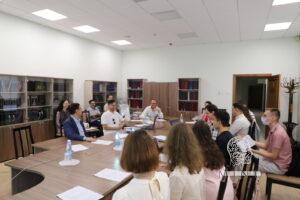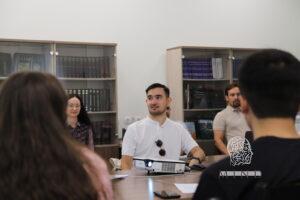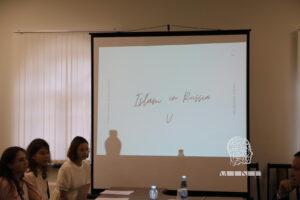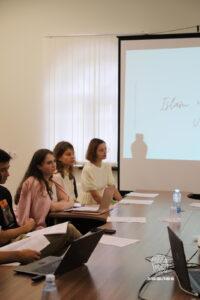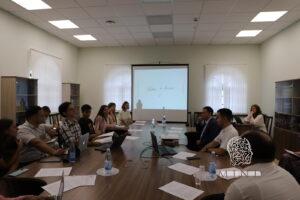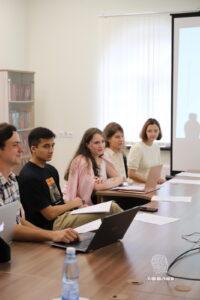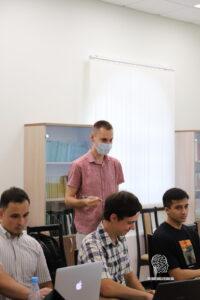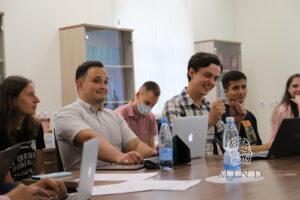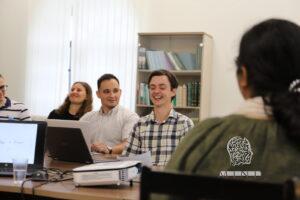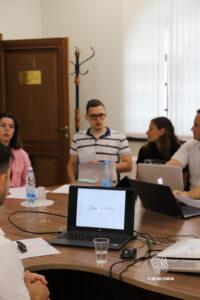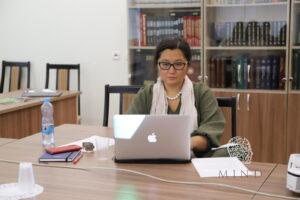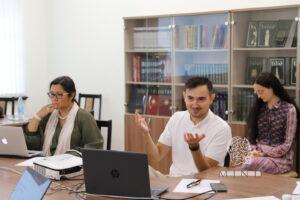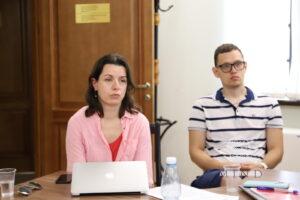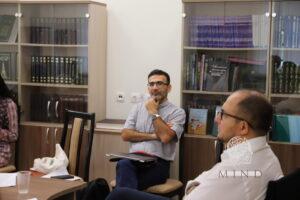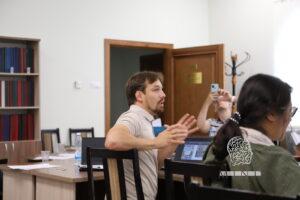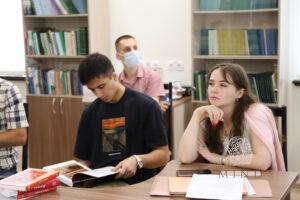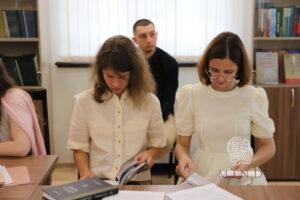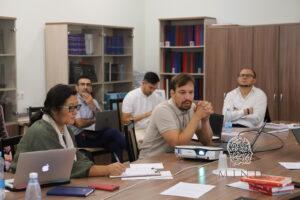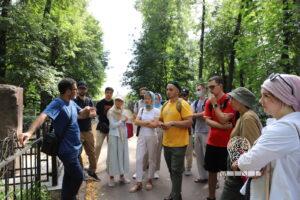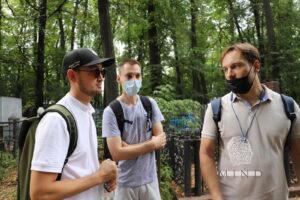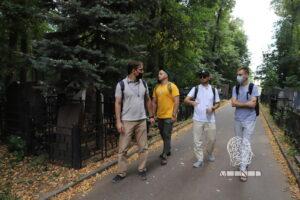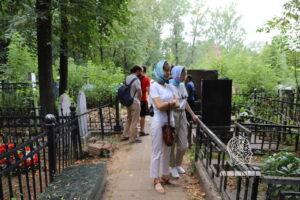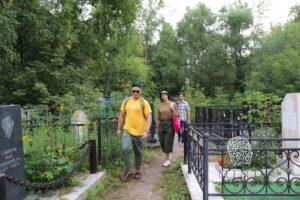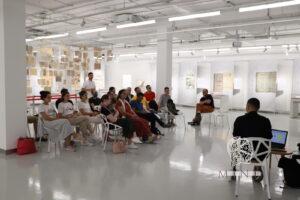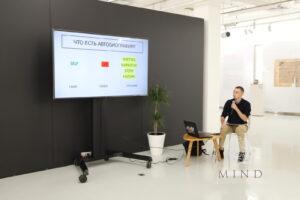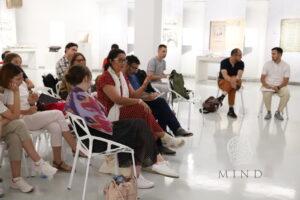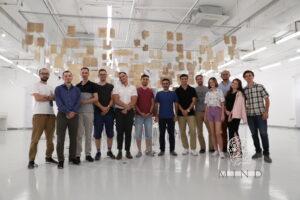The Summer School ‘Islam in Russia V: Muslim Subjectivity in the City’
Our project prioritizes the valorization of academic knowledge and the development of international scholarly networks among the young researchers. From 15th to 22nd of August 2021, the Fifth Summer School ‘Islam in Russia: Muslim Subjectivity in the City’ took place in Kazan. The students went through a careful selection process and joined us from a number of universities from Russia, the United States, Italy, France, the Netherlands, Kazakhstan, and Uzbekistan. Over the week the participants have been discussing the drafts of their articles and chapters of their dissertations as well as listening to lectures on de-colonization of knowledge and anthropological methods in the study of Islam.
The Programme
16 August
10.00. Radik Salikhov, Welcome speech.
10.10 – 11.00. Introduction
11.00 – 12.00. Andrei Lukashev (Institute of Philosophy of the Russian Academy of Sciences, Moscow). Presentation of the Ibn Sina Foundation.
12.00 – 13.00. Alfrid Bustanov (Amsterdam University). Urban Subjectivities after Religion and Nationalism
13.00 – 14.00. Lunch
14.00 – 15.30. Alima Bissenova (Nazarbaev University). (Не)cкромное обаяние халяль бизнеса: взаимодействие исламских и секулярных сфер в предпринимательстве
Readings: Leonie Schmidt, “Urban Islamic Spectacles: Transforming the Space of the Shopping Mall during Ramadan in Indonesia,” Inter-Asia Cultural Studies 13:3 (2012), 384-407.
15.30 – 15.45. Break
15.45 – 17.30. An Interview with Sultan Safin (‘Tubetey’)
18.00. A tour to the Old Tatar Settlement
17 August
10.00 – 11.00. Alfrid Bustanov, The exhibition ‘The Global World of Tatar Book Culture’
11.00 – 12.30. Shamil Shikhaliev (University of Amsterdam). Magomed-Said Saidov and the De-Colonization of Knowledge in the Caucasus.
12.30 – 14.00. Lunch
14.00 – 14.40. Fedor Smetanin (Tomsk State University). Religious Authorities as a Factor in Producing the ‘Muslim Spaces’ of Tomsk (discussant: Lili Di Puppo)
14.40 – 14.50. Break
14.50 – 15.30. Nazari Stella Shokur (The Higher School of Economics, Moscow). The World of a Tatar Student in the Age of Revolution, 1917-1920 гг.: The Diary of Fatima Kashafutdinova (discussant: Mansur Gazimzianov)
15.30 – 15.40. Break
15.40 – 16.20. Diana Cherkasova (the Higher School of Economics, Moscow). Cities in Iran, 9th – 12th Centuries: Social Structure, Economic Situation, Cultural Life (discussant: Galiia Muratova)
16.20 – 17.00. Informal Communication
18 August
10.00 – 11.30. Lili Di Puppo (The Higher School of Economics, Moscow). New Approaches to the Muslim Self: Is there a
Place for Transcendence in the Anthropology of Islam?
Reading: El-Yousfi, Amin. 2020. “The Anthropology of Islam in Light of the Trusteeship Paradigm”. In Islamic Ethics and the Trusteeship Paradigm: Taha Abderrahmane’s Philosophy in Comparative Perspectives, edited by Mutaz al-Khatib and Mohamed Hashas. Boston and Leiden: Brill. Pp. 197-217.
11.30 – 11.40. Break.
11.40 – 13.00. Danis Garaev (Institute of Pedagogy, Psychology, and Social Problems, Kazan). Post-Secularity and Mirasism: Debates on Muslim Theological Legacy in Contemporary Russia
13.00 – 14.00. Lunch
14.00 – 14.40. Vladlena Brykina (The Higher School of Economics, Moscow). A Persian Radishchev? Zayn al-‘Abidin Maragai and his ‘Travellogue of Ibrahim Bek’: Between the Romanized Autobiography and Socio-Political Pamphlet (discussant: Dinara Mardanova)
14.40 – 14.50. Break
14.50 – 15.30. Shahzod Choriev (St Petersburg State University). The Life and Legacy of ‘Abd al-Rahman Jami (discussant: Shamil Shikhaliev)
19 August
10.00 – 11.20. Alima Bissenova (Nazarbaev University). Re-Islamization as De-Colonization
11.20 – 11.30. Break
11.30 – 13.00. Manan Ahmed (Columbia University). Decolonization and History: A Look back at Hindustan
13.00 – 14.00. Break
14.00 – 14.40. Filipp Khusnutdinov (Institute of Oriental Studies, Tashkent). “Turkestani Muslim Communities.. Are Deprived of this Luck’: A Preliminary Study of the Circulation of the Tafsir by Tarazi in Soviet Uzbekistan,” (discussant: Alima Bissenova)
14.40 – 14.50. Break
14.50 – 16.20. Galiia Muratova (University of Amsterdam). The Visual Culture of Soviet Muslims in Private Archives
16.20 – 17.00. Informal Communication
20 August
10.00 – 12.00. A Tour to the Graveyard of the New Tatar Settelement
12.00 – 14.00. Lunch
14.00 – 15.20. Mansur Gazimzianov (University of Amsterdam). Muslim Autobiographies in Russia
15.20 – 15.30. Break
15.30 – 16.10. Ruslan Mamedov (The Higher School of Economics, Moscow). Musa Kundukhov as a Memory Figure. Mosaics of Identity. (discussant: Danis Garaev)
16.10 – 17.00. Informal Communication
21 August
10.00 – 11.30. Teo Benussi (University of California). Voicing Islam in the City: Thinking about Piety, Sound, and the Secular Space
Reading: Charles Hirschkind, The Ethical Soundscape: Cassette Sermons and Islamic Counterpublics (Columbia University Press, 2009), Chapter 4.
11.30 – 11.40. Break.
11.40 – 13.00. Roy Bar Sadeh (Columbia University). Muslim Globalities between Cairo, Kazan and Lahore
Reading: Nile Green, “The Trans-Border Traffic of Afghan Modernism: Afghanistan and the Indian ‘Urdusphere’,” Comparative Studies in Society and History, July 2011, Vol. 53, No. 3, pp. 479-508.
13.00 – 14.00. Lunch
14.00 – 14.40. Ivan Puzyrev (The Higher School of Economics, Moscow). Practices of Accepting the Russian Subjecthood by Bukharans (discussant: Alfrid Bustanov)
14.40 – 14.50. Break
14.50 – 15.30. Ilona Chmilevskaia (The Higher School of Economics, Moscow). The Village Communities and the Feudal Property in the ‘Adats of Qarabudagkent: Law, Society, and Authority (discussant: Roy Bar Sadeh)
15.30 – 15.40. Break
